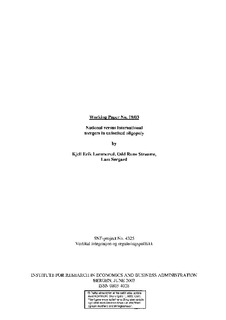| dc.contributor.author | Lommerud, Kjell Erik | |
| dc.contributor.author | Straume, Odd Rune | |
| dc.contributor.author | Sørgard, Lars | |
| dc.date.accessioned | 2006-06-27T10:20:16Z | |
| dc.date.available | 2006-06-27T10:20:16Z | |
| dc.date.issued | 2003-06 | |
| dc.identifier.issn | 1503-2140 | |
| dc.identifier.uri | http://hdl.handle.net/11250/165580 | |
| dc.description.abstract | We analyse how the presence of trade unions affects the pattern of mergers in an international oligopoly and the welfare implications thereof. We find that an international merger results in lower wages for all firms. A national merger results in higher wages, highest for the non-merging firms. Using a model of endogenous merger formation, we find that the equilibrium market structure, if it exists, always implies one or more international mergers. Unless products are close substitutes there are more mergers than socially preferred. | en |
| dc.format.extent | 3208764 bytes | |
| dc.format.mimetype | application/pdf | |
| dc.language.iso | eng | en |
| dc.publisher | SNF | en |
| dc.relation.ispartofseries | Working paper | en |
| dc.relation.ispartofseries | 2003:19 | en |
| dc.subject | endogenous merger | en |
| dc.subject | merger policy | en |
| dc.subject | welfare | en |
| dc.subject | trade unions | en |
| dc.title | National versus international mergers in unionised oligopoly | en |
| dc.type | Working paper | en |
